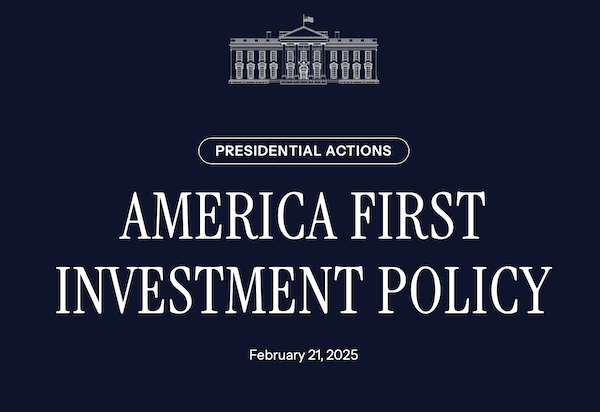The Facade of Economic Security Masks an Authoritarian Agenda
As Americans wake to news of another executive action from the White House, few may grasp the chilling implications of the latest “America First Investment Policy” memorandum. Behind its veneer of protecting national security lies a carefully crafted blueprint for economic nationalism that bears striking parallels to historical patterns of authoritarian consolidation.
“Investment at all costs is not always in the national interest,” declares the memorandum, setting the stage for unprecedented executive control over America’s economic relationships. But the true agenda becomes clear as one dissects this sweeping directive: a systematic dismantling of global economic integration in favor of executive-controlled investment flows that can be weaponized for political purposes.
The Path to Economic Authoritarianism: Context and Background
The America First Investment Policy emerges from a broader ideological framework that combines neoreactionary thought with authoritarian governance models. Drawing inspiration from figures like Curtis Yarvin and Viktor Orban, this approach seeks to concentrate economic power in the executive branch while systematically weakening institutional checks and balances.
The memorandum’s timing is not coincidental. As outlined in Project 2025, it represents one piece of a comprehensive strategy to reshape American governance through executive action. The policy provides the economic scaffolding for broader authoritarian ambitions by granting the executive branch unprecedented control over investment flows.
Dismantling Global Integration: A Strategic Analysis
The directive’s most concerning aspects lie in its broad scope and concentrated power. Consider Section 2(f):
“The United States will use all necessary legal instruments, including the Committee on Foreign Investment in the United States (CFIUS), to restrict PRC-affiliated persons from investing in United States technology, critical infrastructure, healthcare, agriculture, energy, raw materials, or other strategic sectors.”
This sweeping authority effectively gives the executive branch control over vast swaths of the economy under the guise of national security. The memorandum’s definition of “foreign adversaries” is particularly troubling, as it can be easily expanded to include any nation that challenges executive authority.
The policy’s “fast-track” process for allied nations (Section 2(c)) creates a system of economic favoritism that can be used to reward political loyalty and punish dissent. By controlling which nations receive expedited investment approval, the executive branch gains powerful leverage over both domestic and international actors.
Economic Nationalism as a Tool of Authoritarian Control
The memorandum’s approach to environmental reviews reveals its true nature. Section 2(d) states that the administration will “expedite environmental reviews for any investment over $1 billion in the United States.” This provision effectively bypasses environmental protections for large investments, demonstrating how economic nationalism can be used to override regulatory safeguards.
The policy’s treatment of academic institutions is particularly concerning:
“It is past time for American universities to stop supporting foreign adversaries with their investment decisions, much as they should stop granting university access to supporters of terrorism.”
This inflammatory rhetoric equates academic freedom with terrorism support, setting the stage for increased government control over educational institutions through economic pressure.
The Broader Implications: Democracy Under Threat
The real danger lies in how this policy fits into a larger pattern of authoritarian consolidation. By controlling investment flows, the executive branch can:
- Punish dissenting institutions by restricting their access to capital
- Reward political loyalty through expedited investment approvals
- Create an environment of economic dependency that discourages opposition
- Bypass environmental and regulatory protections under the guise of national security
Paths of Resistance: Protecting Democratic Institutions
Citizens and institutions concerned about this erosion of democratic norms have several avenues for action:
- Legal Challenge Routes:
- File lawsuits challenging the broad scope of executive authority
- Support organizations monitoring regulatory compliance
- Document and report instances of politically motivated economic discrimination
- Institutional Resistance:
- Universities can establish independent endowment protection mechanisms
- Businesses can diversify international partnerships to reduce vulnerability
- State governments can create economic safeguards against federal overreach
- Civic Action:
- Contact Congressional representatives to demand oversight
- Support watchdog organizations monitoring investment policies
- Engage in public education about economic nationalism’s dangers
The Urgency of Now
As this policy begins implementation, the window for effective resistance narrows. The combination of concentrated economic power and weakened institutional checks creates a dangerous precedent that, if left unchallenged, could fundamentally alter American democracy.
Every citizen must ask themselves: Will we allow economic nationalism to become the tool by which democratic institutions are dismantled? The answer to this question may determine the future of American democracy itself.
For detailed information on legal resources and resistance strategies, contact:
- [Legal Defense Organizations]
- [Economic Rights Groups]
- [Congressional Oversight Committees]


